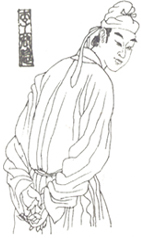- Li Shangyin
Infobox Writer
name = Li Shangyin

imagesize = 140px
caption =
birthdate = ca. 813
birthplace =
deathdate = ca. 858
deathplace =
occupation =Poet
genre =
movement =
period =
influences =Li He ,Du Fu ,Han Yu
influenced =Wang Anshi
website =Li Shangyin (zh-tp|t=李商隱|p=Lǐ Shāngyǐn, ca. 813–858),
courtesy name Yishan (義山), was a Chinesepoet of the lateTang Dynasty , born in Henei (now Qinyang, Henan). Along withLi He , he was much admired and "rediscovered" in the 20th century by the young Chinese writers for theimagist quality of his poems. He is particularly famous for his tantalizing "no title" (無題) poems.Li had a moderately successful career in the imperial
civil service , although he never obtained a high position, either because of factional disputes, or because of his association with Liu Fen (劉蕡), a prominent opponent of theeunuch s.Li was a typical Late Tang poet: his works are sensuous, dense and allusive. The latter quality makes adequate translation extremely difficult. The political, biographical or philosophical implications supposed to be contained in some of his poems have been a subject of debate for many centuries in China.
His most famous and cryptic poem is called "Jin Se" (錦瑟) (the title is only taken from the first two characters of the poem, thus also a "no title" poem), which consists of 56 characters and a string of images. His "no title" poems are regarded as "pure poetry" by some modern critics.
Although more famous for his sensuous poems, Li indeed wrote in many styles. He can be either
satirical ,humorous orsentimental . Moreover, some ancient critics hold that he is the only poet who, in some of his poems, succeeds in imitating the masculine quality ofDu Fu 's works.Influence
In 1968,
Roger Waters of the rock bandPink Floyd borrowed lines from his poetry to create the lyrics for the songSet the Controls for the Heart of the Sun from the band's second albumA Saucerful of Secrets Part of a poem by Li Shangyin is recited by a minor character in the Mortuary in the
computer role-playing game .Biography
Li Shangyin 李商隱 Lǐ Shāngyǐn (812-858) is the love poet par excellence in the Chinese tradition. His poems, particularly his 'Untitled Poems', set a trend for later Chinese love poetry.
Li Shangyin's life was not a particularly successful one. He was born into the lower aristocracy but lost his father, a low-ranking official, when he was 10 years old. Thanks to his poetic ability, he passed his exams at the age of 25 but soon made the mistake of marrying outside his own faction, damaging his chances for political advancement and leading to a career filled with setbacks and frustration. After being buffeted by the factional politics of the declining years of the Tang dynasty and losing his wife at 40, Li Shangyin increasingly turned to Buddhism in his later years.
Although Li Shangyin actually wrote some notable 'political poetry' in response to declining social and political conditions, this has been far outshadowed by his love poems. Much of his love poetry has a melancholic flavour, expressing disappointment and frustration rather than joy and fulfilment. His poems are highly allusive and capable of many different interpretations.
Some of his poetry is about known love affairs, such as an affair with a nun in a Daoist (Taoist) monastery where Li Shangyin spent some time in his 20s. Many more make veiled references to an illicit love affair which carry a strong burden of guilt and the risk of discovery. Indeed, while many theories have been put forward, it is still not known to whom these love poems refer. A. C. Graham supports the theory that she was the concubine of Li Shangyin's father-in-law and second political master. The idea of disloyalty to a master certainly comes through in some of his poems, such as the 'Untitled Poem (ii)' below.
In the face of this, Chinese critics prefer to interpret Li Shangyin's love poetry as allegory. The expression of love for woman is seen as an appeal to the poet's political master or patron, for which there is a long tradition in Chinese poetry, going back to Qu Yuan. Another way of defusing the 'illicit love' suspicion is to see his poems as an expression of love for his wife, coloured by the suffering that her family's factional affiliation caused him.
References
*Chen, Bohai, [http://203.72.198.245/web/Content.asp?ID=64085&Query=1 "Li Shangyin"] . "
Encyclopedia of China " (Chinese Literature Edition), 1st ed.External links
* [http://afpc.asso.fr/wengu/wg/wengu.php?l=Tangshi&auteur=Li_Shangyin&no=-1 two dozens poems of Li Shangyin in traditional Chinese and Bynner's English translation.]
* [http://www.comp.nus.edu.sg/~yuenck/li/ Biography, Chinese texts and translations.]
* [http://www.poetry-chinese.com/lishangyin-m.htm Regulated verses of Li Shangyin, with English translation, pinyin transliteration, and tonal patterns.]
Wikimedia Foundation. 2010.
